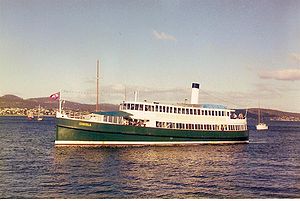MV Cartela
 MV Cartela about 1995 | |
| Career | |
|---|---|
| Name: | MV Cartela |
| Builder: | Purdon & Featherstone |
| Launched: | 1912 |
| General characteristics | |
| Tonnage: | 194 |
| Length: | 123 |
The MV Cartela is an excursion vessel operating on the Derwent River in Hobart, Tasmania, Australia. She is now Australia's oldest continuously licensed passenger vessel, although there are several older vessels still in service that have been restored after lengthy periods in dereliction.
The Cartela is a motor vessel of 194 tons gross, 77 net register, and is 123 feet in overall length (111.0 feet keel).
History
The Cartela (Tasmanian aboriginal name for Bull Seal) was built at Battery Point, Hobart by Purdon & Featherstone in 1912 for the Huon, Channel and Peninsula Steamship Company Pty. Ltd. to operate as a cargo and passenger vessel in the coastal and riverine trades south and south-east of the city. She was primarily constructed to replace an earlier vessel the Awittaka that had recently been sold to the Solomon Islands Government, and was especially designed to be the fastest vessel in the premier excursion trade. This was achieved by fitting the vessel with both powerful triple-expansion steam engines (500 indicated horse-power) and a large capacity boiler that allowed lengthy periods of operation at maximum speed without losing pressure - a problem faced by both her predecessor and her chief rival the 152-ton Togo. The Cartela and Togo competed in an unofficial race held on Christmas Day regularly until 1931, and both won five races each. In 1926 the two vessels collided off Battery Point and the Togo was forced aground. As the vessels had passed out of (State-controlled) harbour waters into (Federal Government-controlled) coastal waters during the course of the race, a Royal Commission was held into whether the Marine Board of Hobart was entitled to hold an inquiry.
Most of Cartela's service until after World War II was spent operating passenger and cargo services between Hobart, Tasman Peninsula and ports on the D'Entrecasteaux Channel with a proportion of excursion activities up and down the River Derwent. She occasionally performed other duties, including a voyage to Melbourne during a seamen's strike in 1919, and as a tug before dedicated tug-boats were employed in Hobart after World War II. One significant tow was of the dismasted barque Inverness-shire, a vessel more than ten times her size, from Storm Bay to Hobart in 1915.
With improved road services connecting outlying regions of south-eastern Tasmania bringing an end to commercial river steamer services, by the 1950s the vessel was almost exclusively engaged in excursion work around Hobart for new owners Roche Brothers Pty. Ltd. Cartela was converted from a steamship to a motor vessel in 1958 and extensively altered and fitted with more powerful engines as a ferry following the Tasman Bridge Disaster in 1975. She is still engaged in excursion work out of Hobart, run by Navigators, although infrequently used due to the large number of faster vessels now servicing the trade.
References
- George Cox, Ships in Tasmanian Waters, 1971
